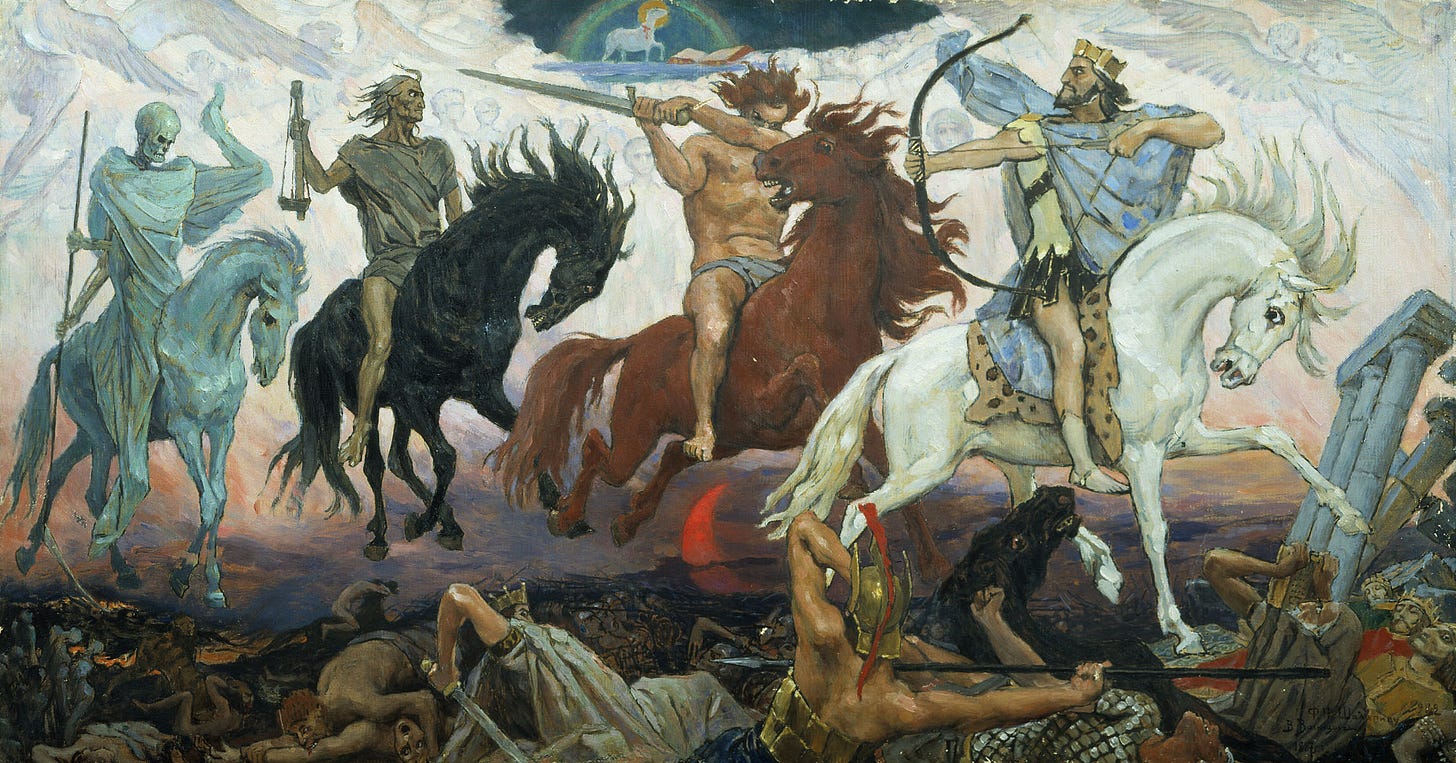The Four Horsemen of the Pop Culture Apocalypse
Do I have a horse in this race?
I’m always worried when people do a podcast ABOUT me, but don’t invite me to the table. That happened again today.
I often just ignore these things—it’s usually best not to know what people say behind your back.
I could tell spine-chilling tales of what happens to eavesdroppers. They punish themselves by their indiscretion.
So just don’t do it!
But Derek Thompson wields a lot of influence right now. His new book with Ezra Klein, Abundance, has been a megahit, staying on the New York Times bestseller list week after week. (It’s currently number five in non-fiction.)
In this kind of situation, I need to pay attention to what people say about me—if only to deal with the fallout. At least that’s what I tell myself.
So I listened when Derek sat down with Spencer Kornhaber of The Atlantic, and assessed some of my views on pop culture.
Please support my work by taking out a premium subscription (for just $6 per month).
As I tried to explain on Wednesday, my verdict isn’t quite as gloomy as it’s made out to be.
But I do share Thompson and Kornhaber’s concern with four themes that I’ve addressed here on The Honest Broker. Thompson calls them “the four horsemen of the pop culture apocalypse.”
Stagnation
Cynicism
Isolation
Attention Rot
Derek offered more details in a tweet he published this morning:
Here is a brief extract from their conversation.
DEREK THOMPSON:
In the last few months, I’ve been thinking a lot about dopamine. I guess it started with an article published in 2024 that I’ve had a hard time knocking out of my head. It was written by a music critic and cultural essayist named Ted Gioia.
In the last few decades, Gioia argues, every facet of American pop culture and leisure evolved from slow to fast. Newspapers morphed into 24-hour news. Albums disintegrated into tracks. Handwritten letters gave way to shorter voice messages.
In category after category, he says, the fast ate the slow. And that would be concerning enough. But it was actually only part one of a two-part shift.
Today, he argues, a new alpha predator has come to town, and it’s not slow or fast culture. It is what Gioia calls dopamine culture.
Newspapers had been replaced by 24-hour news. But now cable news is dying, replaced by clickbait social media posts. Albums had become tracks, but now TikTok is eating both. Watching sports had evolved into watching highlights, but now so much of it just revolves around dopamine urges to gamble money.
The American consumer, Gioia said, often feels him or herself caught in this kind of spin cycle. They feel a moment’s boredom, reach for the phone—dopamine release….Slowly but surely, Gioia argues, pop culture is turning into a kind of virtual casino of the mind….
SPENCER KORNHABER:
Ted is a fierce jazz expert, and really an expert in all kinds of music….We talked about how the financial incentives in the entertainment industry have become realigned to encourage the regurgitation of the old over promoting the new. This is happening in all sorts of ways.
Just to stick with music, once you have these platforms like Spotify or TikTok, which so easily allow the past hits to compete with new ones, that creates new incentives to invest in old music.
So hedge funds and record labels are spending really shocking amounts of money to buy up the publishing rights to classic hits. Everyone from Justin Bieber to Bruce Springsteen have sold their back catalogs to these companies for hundreds of millions or sometimes even billions of dollars. What that means is that these companies have a vested interest in promoting those songs, and they are going to do everything they can to put them in front of people—which is creating pressure and pushing new things out of the marketplace….
That extract just scratches the surface. So you may want to listen to their entire conversation.
There’s a lot more to be said about these subjects, but just raising them to public awareness in an integrated, holistic way is valuable.
That said, I’m especially focused right now on how we can tame these four horsemen of the cutural apocalypse. I’ll have something to say about that in the very near future.





How did you resist the temptation to call this "The Four Horsemen Of The Pop Eclipse"?
Ted: You definitely have a "horse" to ride, but not in the cultural apocalypse derby. You are (one of) the knight(s) who are trying to slay the dragon of the "financial" types who run so much of the music and media businesses. In Western culture, the dragon is a symbol of possessiveness and greed (see, e.g., Smaug).They can't play an instrument, so they buy catalogs of songs. They can't act, so they buy up or license the libraries of the movie studios. And now they fund AI projects to swallow up the world's literature and spew it back in unbearably trite prose. Yes, there are horsemen of the apocalypse; but they mostly are hanging on to the back end of the horse.